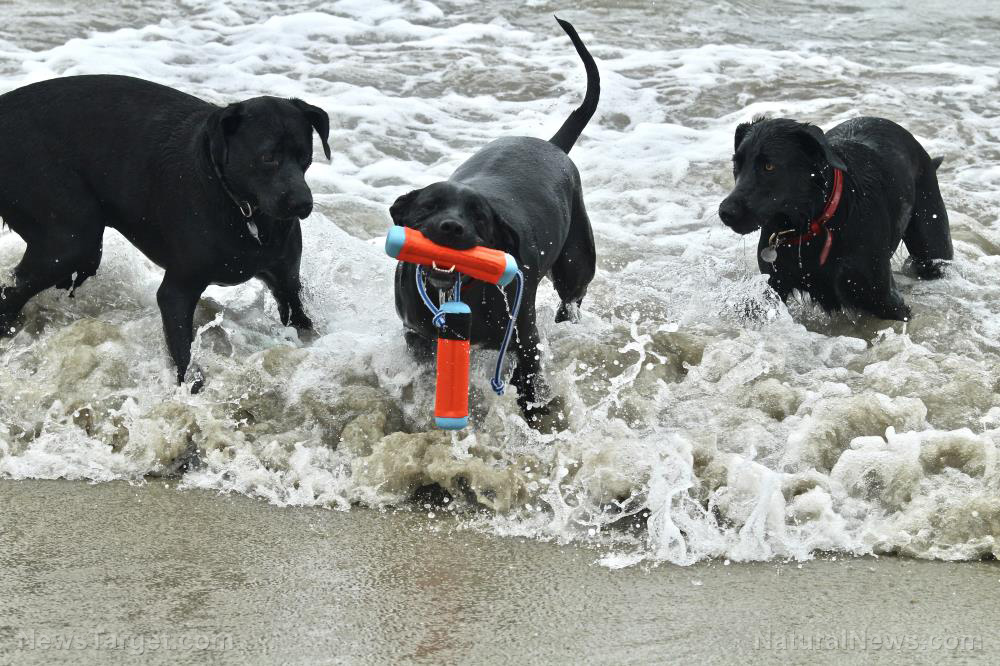Dogs saving the food supply? Trained dogs used to sniff out disease destroying citrus trees in Florida, California and Texas
06/27/2022 / By Mary Villareal

Research suggests that dogs may be able to be trained to help in citrus groves hit by citrus greening disease, a deadly disease that’s hit orchards in Florida, California and Texas.
Citrus greening — also known as huanglongbing — is caused by a bacteria that is spread by a tiny insect that feeds on the leaves and stems of citrus trees. The disease stunts the trees’ growth and causes fruit to develop a green discoloration, hence the name. Once a tree is infected, there’s no cure and it will eventually die after some time.
This disease is very rampant — in addition to orchards in America, it has also affected citrus trees in Central and South America as well as those in Asia.
Using dogs to sniff out tree diseases
To combat citrus greening disease, scientists trained dogs to be able to sniff it out well before its symptoms show. In one experiment, trained dogs were accurate 95 percent of the time in distinguishing newly-infected trees and healthy ones in a Texas grapefruit orchard.
Timothy Gottwald, a researcher with the Department of Agriculture and co-author of the study said: “This technology is thousands of years old – the dog’s nose. We’ve just trained dogs to hunt new prey: the bacteria that causes a very damaging crop disease.” Dogs are also faster, cheaper, and more accurate than sending in leaves for lab analysis.
Matteo Garbelotto, who was involved in similar research at the University of California, Berkeley, said that the new research elevates the study of dog sleuths in orchards, showing that they can detect infections well before current methods can.
Another scientist, Laura Sims of the Louisiana Tech University, said she was impressed by the research and applauded the steps taken to determine whether the dogs were sniffing out the bacteria itself or the plant’s response to the infection.
The researchers infected a variety of unrelated plants with the bacteria in a laboratory, and the dogs were still able to pick out which ones were infected.
“You’ve seen dogs working in airports, detecting drugs and explosives. Maybe soon you will see them working on more farms,” Gottwald said.
Dogs can sniff diseases in humans, too
Dogs have 40 times as many receptors in their noses as humans do, and they are now being trained to detect diseases in humans. While they are not going to be medical assistants soon, they are showing some promise in some areas. (Related: Man’s best friend can save your life from cancer! Dogs detect cancer with 90 percent accuracy.)
Urinary tract infections
After spending eight weeks training Labradors and Golden Retrievers to identify infected urine, researchers say that dogs can detect urine samples contaminated with four different bacteria at 90 percent accuracy. They are used to sniffing pee, and this habit may actually have medical benefits.
Blood sugar
Dogs are known to detect low blood sugar, though it is unclear how they’re able to do so. Dogs4Diabetics, a non-profit organization based in California has been training dogs to detect subtle changes in a person’s smell, associated with low blood sugar.
Cancer
It has been repeatedly shown that dogs can smell different kinds of cancers such as breast cancer, colon cancer and skin cancer — and they seem to be able to do it more accurately than conventional tests. Italian researchers trained two German Shepherd explosive detection dogs to detect cancerous urine. During the study the dogs were able to sniff them out correctly 95 percent of the time, making them more accurate than prostate-specific antigen tests used to screen for prostate cancer.
A different study also showed that a Labrador Retriever trained in scent detection was able to identify colon cancer in breath and stool samples with high accuracy.
COVID-19
Disease-smelling dogs may also be able to sniff out the Wuhan coronavirus (COVID-19). Researchers at the University of Helsinki taught dogs to recognize previously unknown odor signatures of COVID-19 disease. In a few weeks, the dogs were able to accurately distinguish urine samples of COVID-19 patients from healthy individuals to a level of accuracy close to that of a standard PCR test.
Read more strange and wonderful ways that dogs are being used to help doctors, scientists and law enforcement at WeirdScienceNews.com.
Sources include:
UnderstandingAnimalResearch.org.uk
Submit a correction >>
Tagged Under:
animals, botany, cancer, citrus greening, citrus trees, diabetes, Diseases, dogs, food supply, good health, Good science, harvest, health, plants, science, weird science
This article may contain statements that reflect the opinion of the author
RECENT NEWS & ARTICLES
CancerTumors.News is a fact-based public education website published by Cancer Tumors News Features, LLC.
All content copyright © 2018 by Cancer Tumors News Features, LLC.
Contact Us with Tips or Corrections
All trademarks, registered trademarks and servicemarks mentioned on this site are the property of their respective owners.




















